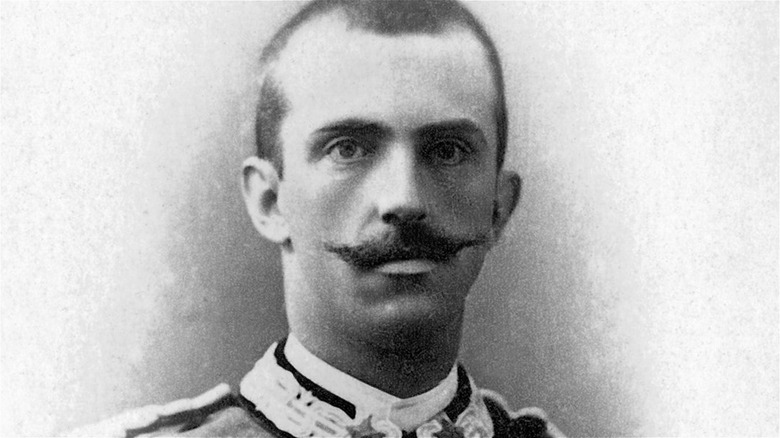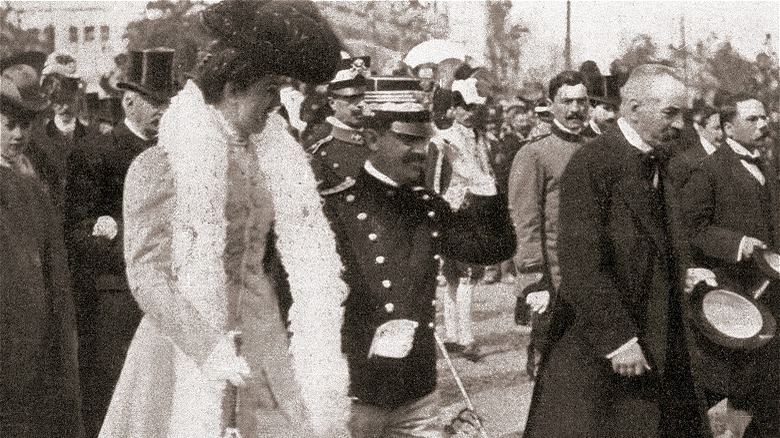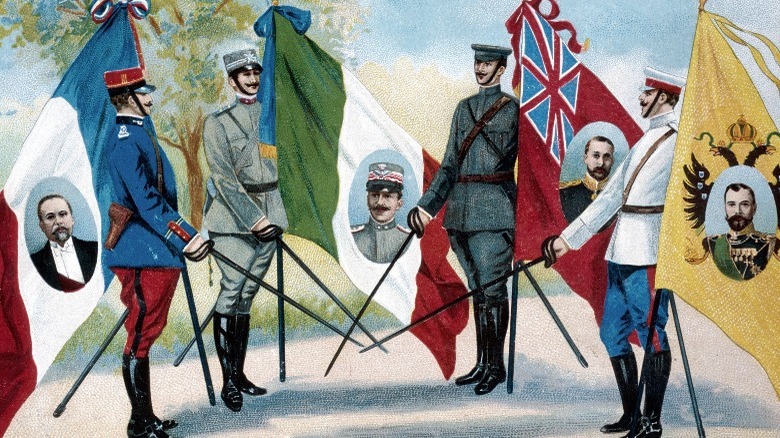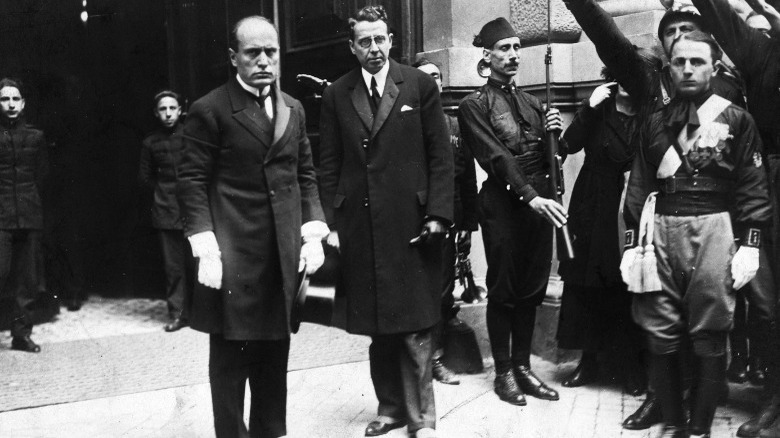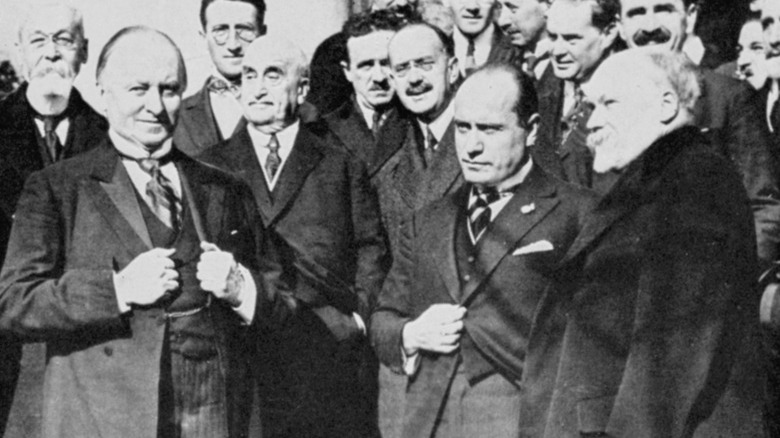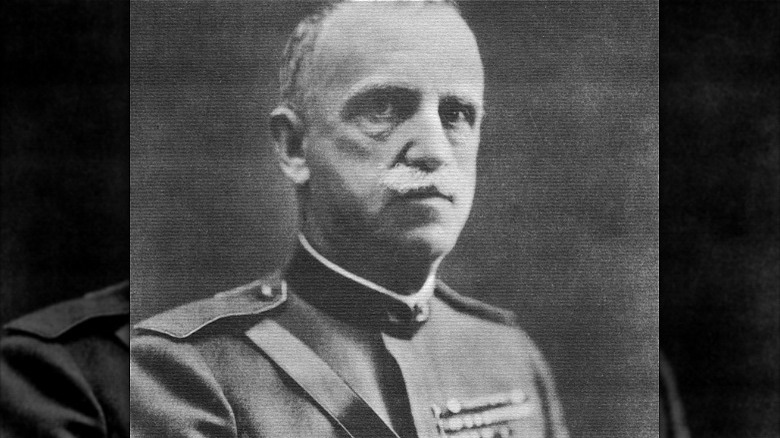Why King Victor Emmanuel III's Controversial Life Affected His Burial
In his play Henry IV, Shakespeare writes, "Uneasy is the head that wears a crown." This quote is generally understood as referring to those in authority and the burden they bear when it comes to being in charge. It's easy to connect this quote to those in a royal position, especially if they are a king. There have been many kings across the ages, and they all have different reputations and legacies they left behind. Some carried their responsibilities with dignity and grace, while others made questionable decisions or cracked under the pressure.
King Victor Emmanuel III of Italy ruled his country during the first half of the 20th century, which was arguably a pretty tumultuous time in history (per Britannica). The tragic death of his father, two world wars, and the rise of a notorious dictator all happened during his rule before he went into exile. Following his death in 1947, his body theoretically should have been returned to his homeland. However, it would take multiple decades of debate and controversy for his remains to arrive back in Italy.
He Became King Rather Suddenly
King Victor Emmanuel III was born on November 11, 1869, to Umberto I and his wife, Margherita Teresa Giovanna (per Britannica). Growing up, he received an education that was heavily focused on the military. Turns out that was a good thing, because that military knowledge would come in handy when he had the crown thrust upon him rather abruptly in 1900.
His father, King Umberto I, ruled Italy for 22 years before he was assassinated on July 29, 1900 (via History). His death came as a result of his governmental policies — which could be considered more authoritarian in nature — and the failure of Italy when it came to colonization. Following his death, his son was crowned King Victor Emmanuel III that same year. The political climate that the king was placed in at the time was somewhat unstable and rather precarious. Unfortunately, the decisions King Victor made during his rule would bring about his eventual downfall.
World War I Gave Him Temporary Popularity
According to TIME, Victor Emmanuel III was reportedly set up by his father for relative success despite the conflicting politics of the time. He had been married off to the king of Montenegro's daughter, who bore him a son to succeed him. The king also received a hefty amount of money when he ascended the throne due to his father taking out an insurance policy before he died. King Victor as a person was reportedly described as a good husband and father, as well as a thoughtful politician.
Around 14 years into his reign, Italy entered World War I on the side of the Allied forces along with Great Britain, France, and the United States (per History). After ending up on the winning side of that conflict, King Victor's popularity did increase among his people a bit. It even earned him a rather adorable nickname, "il piccolo," which translates to "The Little One," in reference to his short stature (per TIME).
Rise of Fascism
Despite the victory the country had during the Great War, there were still many in Italy who were not satisfied with the king or the government. Economic depression following the war added fuel to an already smoldering fire of discontent. Different political factions began to rise in opposition to the monarchy, particularly the growing Fascist party (per National WWII Museum). The leader of this rapidly expanding party was a man named Benito Mussolini.
In October 1922, Mussolini attempted to stage a coup on the existing government and was only stopped after the king and his government were warned of what was coming (via Britannica). As parliament was running amuck trying to figure out how to defend itself, King Victor Emmanuel returned to Rome with an alarming lack of urgency. Upon his arrival, he requested that articles instituting martial law be drawn up, and his prime minister complied. However, in an astonishing twist, the king changed his mind and decided against signing those orders. This one poor decision would be the start of the king's demise.
Questionable Decisions
King Victor's decision to not implement martial law was questionable at best. Then he proceeded to do something not just questionable but downright dangerous. When his parliament and prime minister resigned in protest to his decision, he gave the prime minister job to none other than Benito Mussolini (per National WWII Museum). For whatever reason, there were things that King Victor liked about Mussolini, despite the fact that his prime minister disliked him. Mussolini's power and influence grew exponentially, and the clueless king allowed it.
Once World War II rolled around, Mussolini was ready to go to war on the side of Nazi Germany. King Victor did step in to stop this temporarily but eventually allowed Mussolini to enter Italy into the war. Mussolini was not a great commander, and the military suffered multiple failures before the king retook control and essentially flipped sides. This resulted in further war and turmoil until the Allied forces were ultimately victorious. Unfortunately for King Victor, this did not help him avoid his fate.
Exile, Death, and a Long Journey Home
Following World War II, the king had really fallen out of favor with his people. So much so that in 1946, the king abdicated in favor of his son, who became Umberto II (per National WWII Museum). After his abdication and following a referendum declaring Italy a republic, effectively removing the monarchy, he fled the country for Egypt. On December 28, 1947, King Victor Emmanuel III died of pulmonary congestion and would remain buried in Alexandria for the next seven decades.
In December 2017, King Victor's remains were returned to his native Italy and buried alongside his wife (per BBC). Though time had passed, the king was not received well as there is much controversy surrounding his legacy. King Victor Emmanuel III is often blamed for the rise of a fascist dictator, for passing laws that allowed the persecution of the Jews, and for ultimately ending the Italian monarchy. As such, there was much debate as to whether to bring him home or not. While he has been brought back to Italy, there are still disputes about his final resting place.
